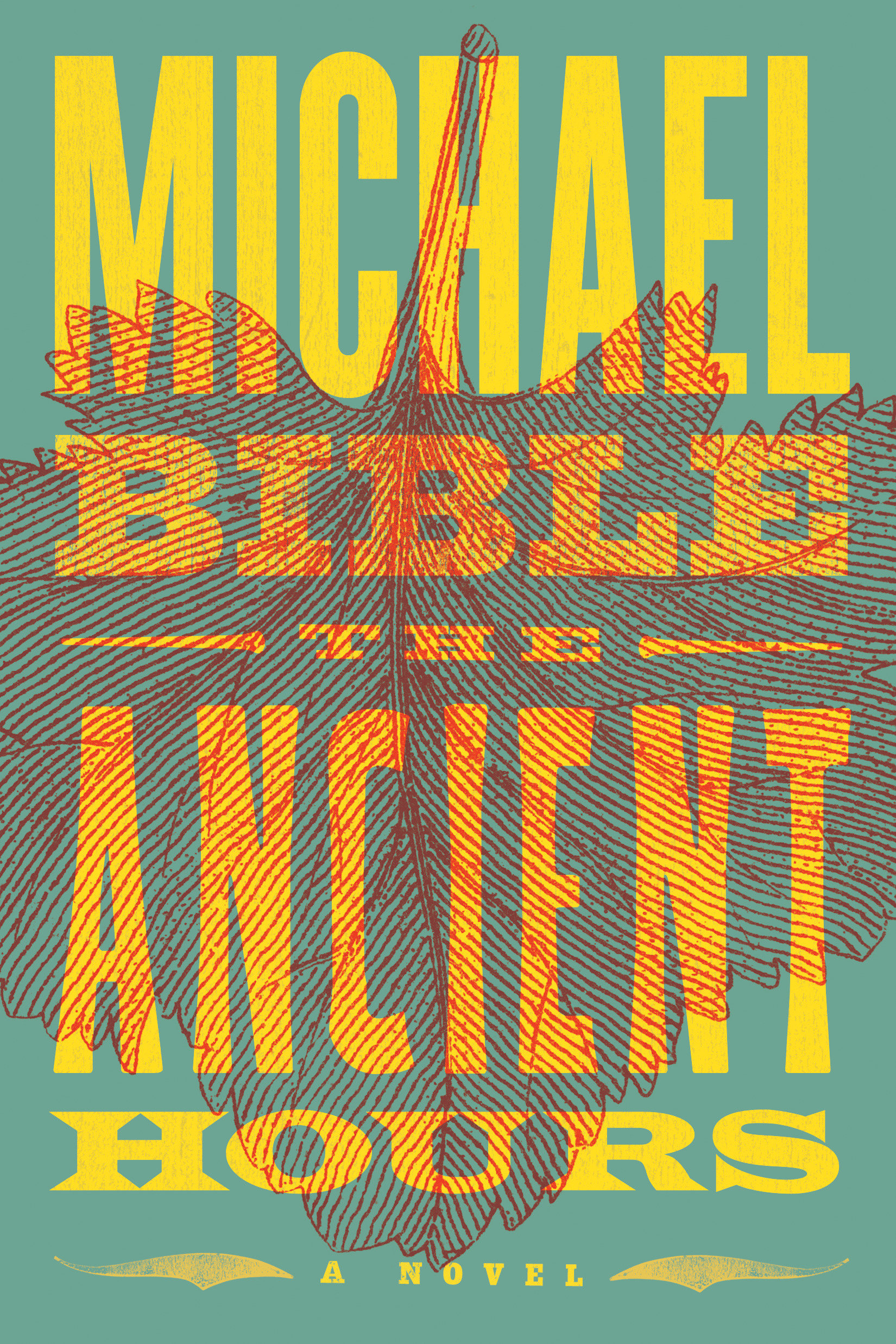Description
“The Ancient Hours […] packs a wallop” —New York Times Book Review “The Ancient Hours is brilliant.” —Bud Smith, author of Work “Bible is a fantastic writer.” —Kevin Wilson, author of Nothing to See Here Harmony, North Carolina is a typical town—full of saints and sinners you can’t tell apart… Its history echoes with lynchings and shootings; mob violence and vigilante justice. But those are just whispers of a past lost to time. The summer of 2000 was different. Iggy in the Baptist church. Gasoline and a match. Twenty-five people dead. This, Harmony couldn’t forget. Told in a kaleidoscope of timelines and voices, Michael Bible examines every dimension of a tragic but all-too-American story in The Ancient Hours. The victims, witnesses, perpetrators, and condemned comingle and evolve as the passage of time works its way through their lives. What emerges is a fable of the American South in the highest tradition: soaring, tragic, and eternally striving for redemption.
Additional information
| Weight | 0.8 kg |
|---|---|
| Dimensions | 0.82 × 13.95 × 2.93 cm |
| PubliCanadation City/Country | USA |
| Format | |
| Language | |
| Pages | 112 |
| Publisher | |
| Year Published | 2020-12-15 |
| Imprint | |
| ISBN 10 | 1612198643 |
| About The Author | Michael Bible is originally from North Carolina. His work has appeared in the Oxford American, The Paris Review Daily, Al-Jazeera America, ESPN The Magazine, and New York Tyrant Magazine. He is a former bookseller at Square Books in Oxford, Mississippi, and lives in New York. |
"Michael Bible’s crystalline new novel, The Ancient Hours […] roams back and forth across time, plumbing crushed lives […] Bible beautifully captures the listless yaw of these outsiders as they search for meaning […] The novel shifts, polyphonic, between timelines, jig-sawing its narrative, revealing depths in the shallowest of characters. The Ancient Hours […] packs a wallop" —New York Times Book Review "A deft novel, the book wraps a diverse community of characters together, while also blending religion, violence, and the consequences of our actions into a slim, rural-tongued package." —Ploughshares "The Ancient Hours, in its purest form, is a story about the quest for family and what people are willing to sacrifice, both internally and externally, to achieve some semblance of community… Bible’s unique voice makes the story of a tragedy in Harmony a successful journey toward healing and community." —Chicago Review of Books "A narrative of deep intimacy in which men and women reach for and sometimes find the places where they can reveal their truest selves… a short, electric read that follows young lovers on a knife’s edge walk between slacker rock daydream and modern nightmare." —Rain Taxi "[B]oth morally serious and emotionally generous—lyrical yet unsentimental… Bible chronicles the wild ways people cope with the humiliating fact of being stuck in time, animals in captivity.… Bible’s artistry replaces the false promise of religion and turns time and its punishments into a sort of pleasure.” —Vol. 1 Brooklyn "Vivid . . . well-written . . . Highlights in bracing clarity one town’s reckoning with a monstrous act." —Publishers Weekly “Nobody else is on Michael Bible’s planet. He distills all the pain and joy of our lives into the most evocative music, the purest medicine. He’s one of our greatest living artists. The Ancient Hours is brilliant.” —Bud Smith, author of Work "In The Ancient Hours Michael Bible brilliantly maps the innate pain of a Carolina town over time. Through an assemblage of complex characters—anarchists and outlaws, fractured families, and lonely librarians, Bible creates a harrowed history that interrogates our present moment. This slim masterpiece might be the book you’ve been waiting for.” —Ryan Ridge, author of New Bad News "Bible's style is unique: swift, mythic without pretense, eccentric but focused." –Literary Hub "Poetic and with flashes of brilliance . . . we have a promising new writer here." –NPR "Bible's talent is such that he knows how to take scripture and bend and twist it into something that can exist in both heaven and hell… Bible is a fantastic writer." –Kevin Wilson, author of The Family Fang "A singular new voice . . . [Michael Bible] is so open, so easy, so fluid, you'll smile with joy turning every page." –Barry Hannah, author of Airships "Most contemporary fiction makes me wonder why people try to write anymore. Michael Bible helps me remember why." –Blake Butler, author of Alice Knott "Michael Bible has the golden hand of Carson McCullers and the joyous cosmic heart of Richard Brautigan." –William Boyle, author of Gravesend and The Lonely Witness |
|
| Excerpt From Book | We were innocent. Believed we were special. Drunk every weekend at the mall. The world was in our hands. Time didn’t matter. Love was a given. Death was afraid of us. Now we’ve got gray in our beards. The sky bruises purple. The mall is dead. We’re the old men we promised we’d never become. Spending our days in the corner booth at the Starlight Diner arguing life’s vagaries. Our town, Harmony, is typical. Just like yours. Full of saints and sinners you can’t tell apart. On late summer Sunday afternoons the light spills over the old clock tower and projects a shadow on the square as big as a mountain. The florist, Floyd Williams, lines his windows with orange gladiolus the size of antique sabers. He has a scar from a fistfight with his youngest son that started over his drinking. Ben White helps Sue Meadows from her car so she can get her back pills. He’s sleeping with a man in Greensboro that his wife doesn’t know about. The fiddle shop is opening. Doug Lightfoot is helping Mary Beth Taylor get her tuning just right. Last year Doug got Mary Beth pregnant even though he’s twice her age. Drove her to Charlotte to get it taken care of. Bud Rogers, the football coach, picks up his car from the body shop. Has a long talk with Theo Knight about the Panthers’ chances this year. Bud sells a little weed on the side mostly to kids from Harmony High School. Theo spends his evenings weeping about his wife who went missing ten years ago. We found an old picture from our eighth-grade class trip to city hall. Iggy stands apart from the group. A bright October day. Orange leaves fall down behind us. Mrs. Maple’s red hair up in a bun. Most of us wear school hoodies except for Iggy. We’ve tried to understand why he wore a yellow rain jacket on a sunny day. Was it a sign? We studied his face for something, anything, that might show us what he would become. That trip to city hall was supposed to teach us about the history of Harmony. We took a bus downtown from school that morning. Ate ham sandwiches and green apples for lunch. Harmony is older than America, Mayor Presley told us. He was a fat, bald man with a tightly trimmed beard. A lifelong bachelor, his family had been in Harmony for over a century. Raised sheepdogs as a hobby. When you drove by his house late at night the blue light from the TV was always on. As we toured city hall, Mayor Presley told us the story of how German and Scots-Irish from Pennsylvania began to settle in this part of North Carolina as early as 1753. They grew crops in the fertile soil with fresh water from the Bluebird River. There was a log cabin that housed worship on Sunday and would one day become the site of the First Baptist Church of Harmony. In 1850 a brick factory arrived founded by JC Pearl that still operates to this day. At the end of the tour we sat in a semicircle around Mayor Presley in his office with the giant town seal above him. A few of his dogs lay at his feet. Maybe you could tell the students about our economy, Mrs. Maple said. Of course, he said. Harmony is one of the largest producers of tobacco in the foothills. We remember the next part clearly. Mayor Presley went into his drawer and pulled out a leaf of dried Carolina tobacco and passed it around and we smelled it and passed it on. It was light brown and fragile. When it came to Iggy he took out a Zippo lighter and lit it on fire. Mrs. Maple blew it out. She grabbed him by the arm and they went into the hall. Mr. Presley looked at the half-burned leaf and opened a window. Now boys and girls, he said. I want you to go around the room and promise me that you will never smoke. We all promised except for Amanda Armstrong. She started crying. I won’t, she said. I won’t promise. Smoking’s so bad for you, Mr. Presley said. My daddy’s a farmer, she said. If everybody quits we’ll go broke. We looked to Mr. Presley to see what he had to say about that. He smiled. There are plenty of smokers in China, he said. Won’t the Chinese get cancer, too, Amanda asked. Mr. Presley laughed. I’m only worried about the boys and girls here in Harmony, he said. I’m not the mayor of China.Just then Mrs. Maple came back in with Iggy. I’m sorry I burned up your leaf, he said. That’s OK, Mr. Presley said. I forgive you as long as you promise you’ll never start smoking. Iggy looked at the ground and nodded. I plan on quitting soon, he said. Ms. Rivers still works here at the Starlight as she did back then when we’d smoke Camel Lights by the pack after a high school football game. Some of us had crushes on her, she was only a few years our senior. But now she’s old like us. Still here. Stuck in this town. As she refills our coffee, talk returns to Iggy as it so often does on afternoons like these. Someone retells the story of the incident when we were kids back in the nineties. The summer before our freshman year. Iggy was always part of our group until then. We’d all gotten onto sports teams or started bands and Iggy was still playing chess by himself and taking piano lessons. One of us, we don’t remember who, came up with the nickname “Cheese Grits.” We’d decided that Iggy was cheesy and the name seemed to fit. When we’d call his house his mom always said he wasn’t around. We figured he was up in his room hiding. Late that summer we got into someone’s dad’s whiskey collection and at midnight went out in the neighborhood to pull pranks. We rolled the Spencers’ house and dumped all the outdoor furniture into Dr. Johnson’s pool. We raided the Mumfords’ garden and took huge bell peppers to Iggy’s house. We left them on his front porch with a note. Looking back we don’t remember why we thought it would be funny to do this, except that we were teenagers and drunk. The note said we’d kidnapped Iggy and if they didn’t give us one thousand dollars they’d never see him again. Throughout the next afternoon, still hungover, each of us got a knock on the door from Iggy’s parents. Iggy’s mom wore no makeup as if she’d been crying all morning and his father was dressed to work in the yard. They told us that all summer Iggy had been saving up money from mowing lawns. He’d taken his cash downtown to buy a video game but on the way there he was assaulted. His money was stolen and he was left for dead in an alley. He was in the hospital for a week and had been at home recovering for months. What we didn’t know, couldn’t have known, was that morning when his parents found the note, Iggy had gone out for the first time since he was beaten up. They thought the attackers had kidnapped him. Finally, to their relief, he walked through the door hours later. Iggy told them he thought he knew who’d done it. As his parents sat with us in our kitchens and living rooms, we admitted it was us. Told them it was supposed to be a joke. That we had no idea about the attack. Our parents made us write letters to Iggy telling him we were sorry, but who knows if he read them or not. After that we tried to call him a few times to hang out, put the whole thing behind us, but he never talked to us again. We’d mainly put him out of our minds after that. He became a character in stories from our youth even though we sometimes still saw him around school. Heard rumors about him and his friends Paul and Cleo. We lived separate from him and believed, naively, that he too was having a normal high school experience full of keg parties and weekends at the lake. Perhaps he was, but we didn’t really think of him again until after graduation and that morning at the First Baptist Church. The fire was already out when the news trucks arrived. The governor came shortly after. Then senators and congresspeople and finally the president, too. They made speeches. Made promises. Raised money to rebuild. Then the president left and the governor left and the congresspeople left and the news people packed up for some new tragedy. For days an eerie silence filled the town. No one knew exactly what to do. Some of us from Iggy’s graduating class gathered to discuss things in a corner booth at the Starlight Diner. That was eighteen years ago. Some have called him a monster, a terrorist, a psychopath, but he was also just a kid. We’ve found it impossible to reconcile those facts. In the intervening years we’ve questioned why Iggy had such disregard for life. Each of us lost something that day and the grief still haunts us. But what was most damaging was our ignorance, our inability to conceive of such brutality. A privileged existence that protected us from seeing the true nature of things. We’ve tried to piece back together time itself, to find some way to undo it. Tragedy tends to follow similar trajectories. A pattern we’re now all too familiar with. The horror of the incident. Brief hours of confusion and grief, followed by days of anger. Weeks of outrage. Some blame violence in movies or video games. Some blame mental illness. Thoughts and prayers and thoughts and prayers and thoughts and prayers. Raise some money. Change is now. Marches and petitions and speeches. Then nothing. Then more nothing. We could talk all night, but Ms. Rivers is kicking us out. You know the bars are open late, she says. We don’t like the bars, we say. Full of young folks. We tip her well and as we leave there is one last memory from that eighth-grade trip. Later that day we toured the county jail with the sheriff. Mrs. Maple joked that he would come arrest all us kids if we talked in class. Which one of these kids is your worst, the sheriff asked. Mrs. Maple looked us over and smiled. She pointed at Amanda Armstrong. She was wearing pigtails with bows. I can’t arrest such a pretty girl, he said. How ’bout this little troublemaker? He grabbed Iggy and put him against the wall and handcuffed him. We howled with laughter. Iggy was kind of smiling too at first. It was all in good fun. Then the sheriff put him in a cell and locked it. We thought that was even funnier and we all laughed harder. The sheriff escorted us out of the room and left Iggy in there for a minute alone. The look on his face when we returned. We’ll never forget it. |
Only logged in customers who have purchased this product may leave a review.






Reviews
There are no reviews yet.